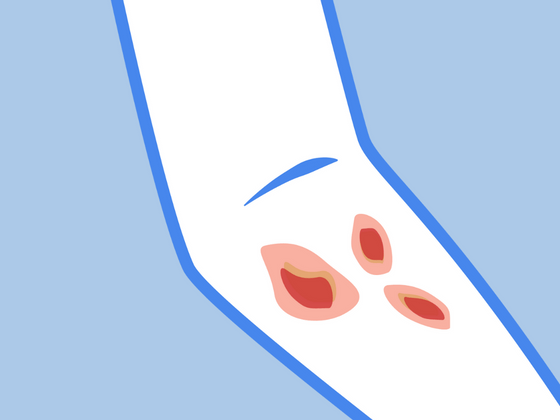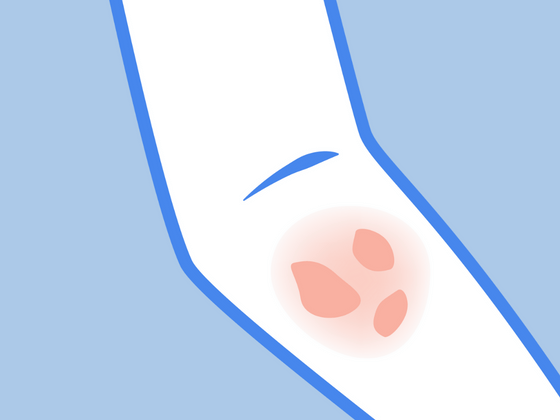The skin around your eyes is some of the most sensitive and delicate skin across your whole body.
With this in mind, it's no wonder your eyelids are often susceptible to dryness, irritation, and allergic reactions.
Throughout this blog, we're going to cover everything you need to know about:
-
The leading causes of dry eyelids
-
Critical symptoms of irritated skin
-
Natural treatment methods and home remedies for healing dry flare-ups
Read on to learn more about protecting your overall eye health and restoring your skin's natural barrier.
Causes of Dry Skin Around The Eyes
The skin of your eyelids is fragile and delicate because, unlike on other parts of your body, such as your arms or stomach, your eyelids are not cushioned by any fat layers underneath.
Your eyelids are also laced with blood vessels. Due to this, this part of your body is more susceptible to irritation and allergic reactions because any substances applied to your eyelids (such as face creams, for example) may be absorbed quickly into the bloodstream.
Pin-pointing the cause of your dry eyelids is essential in finding the most effective treatment. However, skin irritations can be caused by a vast range of genetic and environmental factors, so it can be challenging to get to the root cause. To help get you started, let's explore some of the most common culprits:
Eczema Eyelids
Itchy eyelids may point towards an underlying skin condition such as atopic dermatitis for some individuals.
Atopic dermatitis (eczema) is a chronic, life-long condition impacting approximately 16.5 million Americans today. It's caused by a combination of genetic and environmental factors and is characterized by an impaired skin barrier, an imbalanced skin microbiome, and repetitive flare-ups of itchy, flaky skin.
Causes of Eyelid Dermatitis
Many factors, such as psychological stress, seasonal changes in air temperature and humidity, or excessive sweating, can trigger eyelid dermatitis.
Other common forms of eczema that may cause flaky skin around the eyes include seborrheic and contact dermatitis.
Allergic reactions
Contact dermatitis is a form of eczema triggered when your skin comes into contact with an irritating substance, such as harsh chemicals within your makeup or skincare, and environmental allergens, such as pet dander.
Like atopic dermatitis, irritant dermatitis is characterized by intense itching, soreness, and inflamed skin.
Due to a phenomenon known as the atopic march, contact dermatitis may often coincide with hay fever symptoms, with irritated skin triggered by high pollen counts, for example.
Specific food allergies may also manifest as itchy, weepy eyes, such as an allergic reaction to gluten.
Demographic Factors
Regardless of whether or not you have an underlying skin condition, a number of demographic factors increase your risk of developing dry eyelids and skin irritations.
Age
As you age, the amount of oil in the top layers of your skin barrier will naturally reduce, making it harder for your skin to retain moisture over time.
Diet
If you're malnourished or do not have access to a healthy, balanced diet, you might experience a vitamin or mineral deficiency.
Over time, this can alter the structural integrity of your skin barrier, weakening your body's protective layer and leaving you more susceptible to secondary infections and inflammations.
Environmental Factors
If you live in a particularly dry, cold, or hot climate, it's also likely that you'll experience more frequent bouts of dry skin.
This is because harsh weather strips your skin of natural oils, leaving your eyelids dry.
Within hot environments, too, prolonged sun exposure may lead to dehydration and excessive use of tanning beds.
Symptoms of Dry Eyelids
Facial skin dryness will manifest differently for every individual. Despite this, however, there are a few key symptoms to keep an eye out for:
-
Scaly, flaky skin
-
Rough, itchy skin
-
Oozing and crusting
-
Cracked skin and bleeding in severe cases
-
Redness around the eyes, which may spread to the rest of your face
-
Watery, streaming eyes
-
Stinging or burning sensation
If you feel your vision is becoming impaired due to skin irritation or you cannot focus on day-to-day tasks, we encourage you to seek medical attention.
Natural Treatments for Eyelid Dryness
Coping with sensitive skin around your eyes can be a struggle. Thankfully, many effective home remedies and treatment options are available to help you soothe your dry skin naturally.
Use A Gentle Moisturizer
One of the most impactful ways to combat dry eyelids is to moisturize your facial skin generously and regularly.
This Organic Calendula Salve contains vitamins, antioxidants, essential fatty acids, plant compounds, and natural enzymes. It has been specially formulated to tackle dry patches on even the most delicate skin.
Apply twice daily or as often as required to ease itching and inflammation.
Adjust Your Skin Care Routine
Unfortunately, many of the harsh chemicals in commercial skin care products can worsen symptoms of dry skin.
This is particularly true with facial cleansers, which often strip your skin of natural oils and may trigger irritant contact dermatitis.
To avoid making this mistake, we recommend patch-testing any new skincare or makeup products on your neck for 24 hours to check that you are not allergic to any ingredients.
Avoid washing your face with hot water and opt for warm water instead. While it might be tempting to treat yourself to hot showers, particularly during winter, excessive exposure to hot water can damage your skin barrier, reducing the ability to absorb and retain moisture and triggering a dry skin flare-up.
Warm and Cool Compresses
If your dry skin is severe, we recommend applying cool or warm compresses to the skin on your eyelids.
To do so, first, moisturize your eyelids generously with a natural emollient. Next, submerge a soft, hypoallergenic fabric in a bowl of warm water. These Remedywear™ Sleeves/Bandages are an excellent choice for creating a compress as they have been made with anti-itch tencel and zinc.
Next, wring the fabric out so it is damp but not drip. Then, drape this delicately across your eyelids to lock in extra moisture and soothe inflammation. Sit back and relax.
Medical Treatment
In severe cases, medical attention may be required to treat dry skin.
For example, a board-certified dermatologist may be able to prescribe you steroid eye drops and artificial tears to combat dryness and topical or oral antibiotics to reduce the risk of secondary infections.
Combat Eyelid Eczema Today
Your skin plays a vital role in protecting you from environmental irritants, allergens, and infections; the skin around the eyes is no exception.
To care for your delicate eyelids and facial skin, follow these tips to help you understand where your dry patches might stem from and how best to repair and reinforce your skin's barrier.








